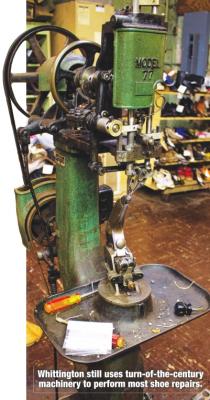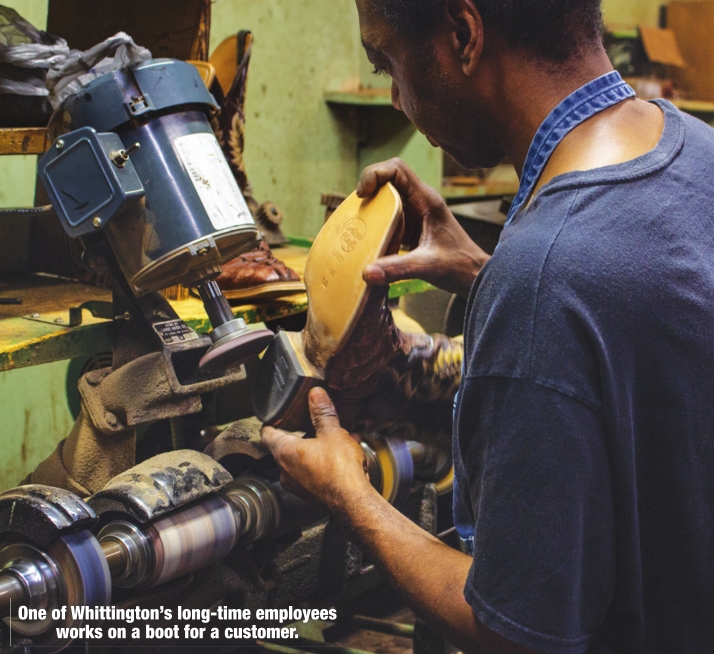Leone’s Shoe Shop: A Step Into the Past

Keeping footwear serviceable for 65 years
I n the age of planned obsolescence and a “throw away” mentality, the idea of repairing items is fast disappearing. Most appliance owners have heard a service representative say that it would cost more to repair an item than to replace it.
n the age of planned obsolescence and a “throw away” mentality, the idea of repairing items is fast disappearing. Most appliance owners have heard a service representative say that it would cost more to repair an item than to replace it.
Dick Whittington has been fighting against the idea of discarding used items since 1980. When he took over Leone’s Shoe Shop on Line Avenue, he was 19 years old, and only the third owner of the shoe repair and refurbishing company.
Frank Leone started the business in 1952 and operated it for 26 years before selling to a friend of Whittington’s family, who operated it until 1980. When he took over, Whittington said, there were 17 shoe repair shops in Shreveport and Bossier City. Today, there are seven left. The reasons are people and fashion have changed. In the past, almost every business person wore a suit and hard-soled shoes as their business uniform. Today’s fashion mindset is more casual. Manufacturers have begun producing shoes that are reflective of the more casual atmosphere. Hard leather soles have become an endangered species.
The type of material used in shoe manufacturing means that repairing them is difficult, if not impossible. You cannot put a new rubber sole on a pair of athletic shoes when they wear out; they have to be replaced.
That’s not to say that shoes that can be repaired are non-existent. In fact, in a 15-minute period on a recent Friday afternoon at the end of the lunch hour, there was a steady stream of customers either picking up or dropping off shoes for Whittington and his staff to repair.
Since he took over the store, Whittington says it’s impossible to estimate the number of people who have come to get a heel replaced or a new sole fitted on a pair of leather shoes or boots that otherwise are still serviceable. The ladies stop by to get new caps put on their high heels when one gets lost or worn. He said people still want to keep their favorite pair of shoes or boots repaired and looking good.
Walking into the store is like a step back into the past when handworked crafts were valued. There is the unmistakable smell of leather and polish, and the sound of the machinery running in the workroom to put new life in a worn shoe. But the “clients” aren’t just brogues here.
Whittington said they repair boots, purses, belts, even luggage for customers, many of whom have been trading with Leone’s for generations. There is a wall of shoe-care products that displays virtually any item you can imagine to bring footwear back to almost new. Some customers will drop in for a quick shoeshine, while some leave them for pickup. It’s one of the few places you can get someone else to shine your shoes unless you go to a traditional men’s barbershop.
Sixty-five years is a remarkable longevity for any business, and Whittington attributes the success of Leone’s to his customers and his employees. “James and Don have both been with me for over 30 years,” he said. “You can drive from downtown to Ellerbe Road on Line Avenue, I bet, and not find another business that’s been in the same building that long.”
Determination is not the only factor in the long-term success of any business, and Whittington said that loyal customers keep coming back and new clients are gained along the way, he said. “They are the reason I do what I do.”
The lesson seems to be that getting along in life, even in this high-tech age, often means taking care of your sole.
– Joe Todaro

